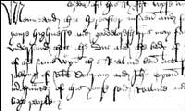The remarkable tale of a fifteenth century Bristol merchant whose daring – and, ultimately disastrous – expedition to the Aegean resulted in losses equivalent to £2.5 billion today, has come to light thanks to an unexpected find in a German archive.
Previously unknown historical documents in the archive of the City of Cologne provide a fascinating insight into the story of Robert Sturmy, a fifteenth century Bristol businessmen whose Mediterranean voyage was the most ambitious expedition undertaken by any Englishman in the Middle Ages.
The documents will be published in full by the Bristol Record Society today with an extensive introduction by Professor Stuart Jenks of the University of Erlangen in Germany, who made the discovery, and a foreword by Dr Evan Jones of the University of Bristol.
Robert Sturmy is a man few people have ever heard of and yet the discovery of these documents reveals him to be one of the boldest and bravest pioneers ever to leave Britain’s shores.
Sturmy came up with a plan to establish England as a major commercial power. His venture, undertaken in 1457-8, was an attempt to break the Italian monopoly over Mediterranean trade and establish a direct trade with the Ottoman Empire and the rest of the Levant.
Raising money from some of the leading aristocrats of his day, as well as from his home town, Sturmy outfitted a fleet of three Bristol ships, provided them with a cargo and then set off to the Aegean. There he planned to trade English cloth, tin and lead for Asiatic goods.
Unfortunately, Sturmy’s voyage did not go to plan. Although he was able to trade successfully with Italy, Greece and Turkey and obtain a valuable cargo to take back home, his fleet was attacked by pirates dispatched (it was later alleged) by the city state of Genoa. The Katherine and Marie of Bristol were taken and the crew killed (128) or set out on land near Malta to fend for themselves. Sturmy lost his life, but his partner John Heyden made his way back home.
In England, the loss of the expedition caused a meticulously orchestrated uproar. The entire Genoese community in England was imprisoned and their goods impounded. This was understandable given that the losses, estimated at £20,000, would, relative to the economy of medieval England, be equivalent to £2.5 billion today.
While the Genoese were condemned by king and council to pay £6,000 in damages, they were able to put the English off – for the time being – from challenging the Italians’ control over the Mediterranean. Bristol merchants now turned west in the search for new trading opportunities and, having been frustrated in the Old World, they went to the New instead, with John Cabot’s discovery of North America in 1497.
Nonetheless, Sturmy established the pattern which later voyages of discovery and the great English Companies of the 16th century were to follow.
So, if Sturmy’s early voyage was so important, why have so few people ever heard of it? The main reason is that little has been known about the expedition – until now.
The Cologne documents – transcribed court proceedings, of which no English historian was aware – provide much new detail about the expedition, including swashbuckling eye-witness reports of the battle at sea and depositions by sailors and Sicilian officials. They were discovered by Professor Jenks as he conducted research on a quite different subject: the history of the German-based Hanseatic League. The documents reveal what the expedition aimed to achieve, how it was financed, how it was conducted and how it was lost.
Dr Evan Jones of Bristol University’s Department of Historical Studies said: “This is the most exciting document discovery relating to Bristol history in years. Sturmy wasn’t just a figure of local importance, he was a major national figure who deserves to be recorded as a forerunner of the British Empire. Maybe now he’ll get the recognition he deserves.”
